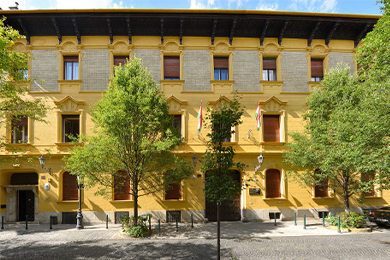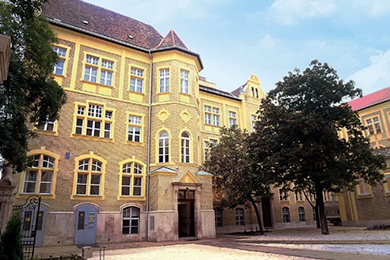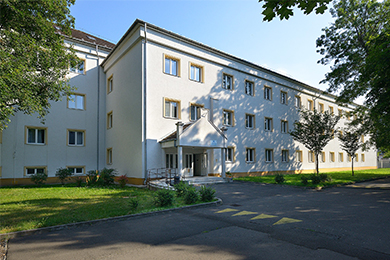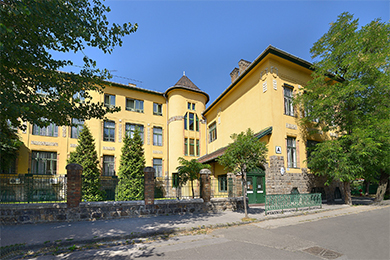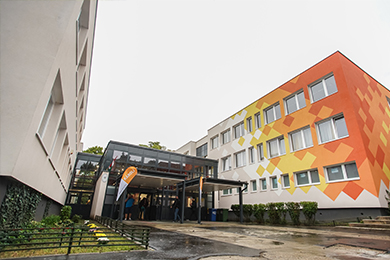Dear Student! Dear Inquirer!
For information on institutional points that can be obtained on the basis of disabilities when applying to higher education institutions, please visit www.felvi.hu. In the case of study programmes offered by the Károli Gáspár University of the Reformed Church in Hungary, the number of institutional points that can be acquired during the higher education admission procedure on the grounds of disability and the documents certifying eligibility are available in the “Institutional points” submenu for each study programme in the Admission Guide on www.felvi.hu.
For information on how to prove a disability during your university studies and the benefits available on the grounds of disability, see the summary for students below. We aim at supporting our students with disabilities in their university life and studies.
1. Who is considered disabled?
In accordance with Article 108 (6) of Act CCIV of 2011 on national higher education (hereinafter referred to as the National Higher Education Act), a student (applicant) with a disability is “a student or applicant with motor, sensory or speech disability, or multiple disabilities, autism spectrum disorder or any other disorder of psychological development (severe learning, attention-deficit disorder or behaviour disorder)”.
2. How and when should I inform the University that I have a disability?
If you have a disability, please submit a declaration and a document certifying your disability upon enrolment. We also encourage our students who are not yet registered to registrate with the Faculty Registrar’s Office/Faculty Coordinator preferably at the beginning of the academic year by 1 October, but proof of disability can be provided at any time later during the studies.
The declaration form is available in Annex 12 to the Academic and Exam Regulation, Part III, Student Requirement System of the Organizational and Operational Rules of Károli Gáspár University of the Reformed Church in Hungary, available at https://english.kre.hu/index.php/degree-students.html
3. How can I prove my disability?
Pursuant to Article 49 (8) of the National Higher Education Act and Government Decree 87/2015 (IV.9) on the implementation of certain provisions of Act CCIV of 2011 on national higher education (hereinafter referred to as Implementation Decree):
(1) The type of disability of a student (applicant) with a disability can be certified by an expert opinion issued by the body specified in sections (2)-(5).
(2) If the student’s (applicant’s) disability or special educational needs already existed during his/her secondary education, the disability or special educational needs can be confirmed by an expert opinion issued by the county (capital) pedagogical assistance service institutions and their member institutions acting as county expert committees.
(3) If the students’ (applicants’) disability or special educational needs did not exist during their secondary education, the disability that arose afterwards can be certified by an expert opinion issued by the ELTE National Pedagogical Assistance Service. http://gyopsz.elte.hu/
(4) If a non-Hungarian applicant does not have a place of residence, or failing that, a domicile in Hungary, the disability can be proved by a certified translation of an expert opinion issued abroad, notwithstanding sections (2) and (3). The higher education institution shall publish on its website a list of languages for which a non-certified translation is also accepted.
(5) If a non-Hungarian applicant or student has an expert opinion issued abroad, the disability can be proved by a certified translation of the expert opinion issued abroad, notwithstanding sections (2) and (3). The higher education institution shall publish on its website a list of languages for which a non-certified translation is also accepted.
If the student’s or applicant’s disability or special educational needs already existed during their secondary education, the disability or special educational needs can be confirmed by a detailed expert opinion. The expert opinion is prepared by the expert committee of the county (capital) pedagogical assistance service institutions (or their member institutions acting as county or national expert committees) on the basis of a complex examination of the student, in line with Decree No. 15/2013 (II. 26.) EMMI on Pedagogical Assistance Service Institutions. (Among the legal predecessors of the pedagogical assistance service institutions, the expert and rehabilitation committees examining learning abilities and the national expert and rehabilitation committees were allowed to issue expert opinions.)
If the applicant does not have an expert opinion under Article 63 of the Implementation Decree, final expert opinions (without a review period) issued by the legal predecessors of rehabilitation assistance service institutions (e.g. capital and county government institutions, NRSZH, OOSZI) are still acceptable pursuant to Article 75 of the Implementation Decree. The expert opinion should always include the name and/or ICD (International classification of diseases) code of the disability. In its absence the document may not be accepted. If the expert opinion includes a reference to a review, the expert opinion (supplement, amendment) issued during the review must also be submitted. However, the supplement or amendment can only be accepted together with the detailed expert opinion. The certificate must be valid during the admission procedure and the period of student status. (This date is not the same as the date of issue of the document.)
Attention! An expert opinion extract, a summary expert opinion, a supplementary expert opinion or a certificate from the issuing body are not acceptable as proof of disability, even if they would otherwise be (formally) correct.
Nor can a preliminary expert opinion be accepted, as it only provides information on the expected content of the final expert opinion which may be appealed by the parent or the student of age.
Certificates, decisions and other documents issued by the following organisations are also not acceptable:
- Medical opinions, official certificates, as they only contain the extent of the health impairment, not the name of the disability.
- Expert opinions issued by the county (capital) pedagogical services on integration, learning and behavioural difficulties and those previously issued by child counselling centres.
- Expert opinions, extracts, certificates issued by a judicial expert (if issued after 1 January 2008).
- Chief physician’s opinion (if issued after 1 January 2008).
- Outpatient treatment report, final hospital report, specialist certificate, medical report, referral.
- Other certificates signed and stamped by doctors (e.g. Hungarian State Treasury, Regional State Treasury Office, National Health Insurance Fund, etc.)
- Secondary school decisions on the exemption from a certain subject.
- Decision issued by a higher education institution on the exemption from the requirement to take a state-recognised foreign language examination on the grounds of disability.
- Medical reports, treatment reports and other certificates issued by psychiatric institutes, Autism Foundation (and Research Group), Vadaskert Hospital and the Early Intervention Centre Budapest.
- Decision on invalidity benefit, because it does not contain the name of the disability, only a reference to the decision of the National Office for Rehabilitation and Social Affairs and its predecessors.
- Decisions on blindness benefits, because they do not contain the name of the disability, only a reference to the decision of the National Office for Rehabilitation and Social Affairs and its predecessors.
- Cards proving disability (blind, limited mobility, deaf or disability card).
- Documents issued by speech and language therapy institutes.
- Certificates issued by Démosztenész Foundation.
- Certificate of the Meixner Foundation.
- Bank account statements of disability benefits, blindness benefits, so called “pink cheques”.
- Payment certificates, tax documents, certificate for tax relief.
- Public health care card.
- Expert opinions of speech correction institutes.
- Certificate of authority issued by the Hungarian State Treasury/National Health Insurance Fund (MÁK/OEP) on the increased amount of family allowance.
- Certificate from the general practitioner.
- The audiogram or the recommendation to use a hearing aid.
4. As a student with a disability, what benefits and facilitation am I entitled to?
Article 43 (1) of the National Higher Education Act:
“Students shall have the right (…) to receive services that correspond to their conditions, personal abilities and disabilities.”
Article 49 of the National Higher Education Act:
“Students with disabilities shall be given the opportunity to prepare for and take examinations in a manner adapted to their disabilities, and shall receive assistance for meeting the obligations arising from student status. In justified cases, disabled students shall be exempted from learning certain subjects, or parts thereof, or the obligation to participate in an assessment. Where necessary, exemption shall be granted in respect of a language examination, or a part or level thereof. Disabled students shall be allowed a longer preparation during the assessment, the use of aids, such as a typewriter or computer, for written examinations and, where appropriate, the option of taking a written examination instead of an oral one. The exemptions pursuant to this paragraph shall be granted only in respect of the grounds thereof and shall not entail exemption from the basic academic requirements to be fulfilled for obtaining the qualification attested by the diploma.”
Article 62 (1)- of Government Decree 87/2015 (IV.9) on the implementation of certain provisions of Act CCIV of 2011 on national higher education contains detailed information on the benefits that can be granted to students with disabilities.
The benefits available at Károli Gáspár University of the Reformed Church in Hungary for students classified in certain categories of disabilities are described in detail in the Regulation for Ensuring Equal Opportunities for Students with Disabilities, Part III. 8 of the Student Requirement System of the University’s Organizational and Operational Rules.
5. How can I make use of disability benefits?
The student may, in view of his/her disability, request a partial or full exemption from the fulfilment of the academic obligations, or examinations, or permission to fulfil them in another way, on the basis of the expert opinion under Article 63 (1) of the Implementation Degree of the National Higher Education Act.
The University’s Committee for Students with Disabilities is responsible for assessing disability benefits. The Committee is composed of 1-1 member per faculty and is chaired by the Institutional Coordinator.
To apply for the benefits (exemptions, facilitations) a request should be submitted to the Committee for Students with Disabilities. From 5 February, 2024, the requests should be submitted in Neptun Education Administration System (hereinafter referred to as Neptun).
The request should be accompanied by the relevant expert opinion certifying the disability, unless it was submitted at the time of registration.
Requests submitted on paper or by e-mail will not be accepted by the Committee for Students with Disabilities.
The Committee for Students with Disabilities will make a decision within 30 days of the request being submitted, which will be notified to the student via Neptun. The decision will be communicated to the Registrar’s Office of the Faculty responsible for the student’s study programme, the programme supervisor and the lecturers of the courses concerned. The Secretary of the Committee for Students with Disabilities checks the request and the attached documents submitted by the student. If the student is found to have submitted an incomplete request and the Committee’s Secretary has returned it to the student to correct deficiencies, the time until completion does not count towards the administration deadline.
6. Where can I turn with questions concerning disability?
If you have questions concerning disability, you can contact your faculty coordinator.
Institutional Coordinator, Chairperson of the Committee for Students with Disabilities:
Dr. Zsuzsanna Turcsán-Tóth, assistant professor
e-mail: This email address is being protected from spambots. You need JavaScript enabled to view it.
office hours: on Thursdays between 9:00-10:00, based on prior appointment by e-mail
Faculty Coordinators:
Mária Vas, Head of Registrar’s Office
e-mail: This email address is being protected from spambots. You need JavaScript enabled to view it.
office hours: based on prior appointment, during the office hours of the Registrar’s Office of the Faculty of Law, available at https://ajk.kre.hu/index.php/hallgatoinknak/tanulmanyi-osztaly.html
location: KRE-ÁJK 1042 Budapest, Viola utca 2-4. („A” building), mezzanine 7.
- Faculty of Humanities and Social Sciences
Dr. Zsuzsanna Turcsán-Tóth, assistant professor
e-mail: This email address is being protected from spambots. You need JavaScript enabled to view it.
office hours: on Thursdays between 9:00-10:00, based on prior appointment by e-mail
- Faculty of Economics, Health Sciences and Social Studies
Dr. Dániel Lőkös, associate professor
e-mail: This email address is being protected from spambots. You need JavaScript enabled to view it.
office hours: in person or online based on prior appointment by e-mail
Dr. habil. Anette Papp, habilitated associate professor
e-mail: This email address is being protected from spambots. You need JavaScript enabled to view it.
office hours: based on prior appointment by e-mail
Dr. Norbert Gombos, college professor
email: This email address is being protected from spambots. You need JavaScript enabled to view it.
office hours: on Mondays between 11:00-12:00, based on prior appointment by e-mail
location: KRE-PK 1042 Budapest, Árpád út 161-163. mezzanine 2/A
Student members of the Committee for Students with Disabilities:
Dóra Lengyel, as a member delegated by the KRE Students’ Union
Dr. Edina Lajos (Dr. Cservákné Dr. Lajos Edina), as a member delegated by the KRE Doctoral Students’ Union:
For further information, please contact the International Relations Office:
1091 Budapest, Kálvin tér 9., room nr. 14.
Ms. Viktória Soós (full-time students)
email: This email address is being protected from spambots. You need JavaScript enabled to view it.
Ms. Virág Zombory (exchange students)
email: This email address is being protected from spambots. You need JavaScript enabled to view it.
Documents
Regulation for Ensuring Equal Opportunities for Students with Disabilities
Statement
Some useful links for our students with disabilities:
Free accessible, learning support programmes.






